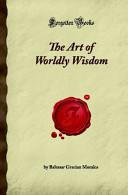Quotes from book
The Art of Worldly Wisdom

The Art of Worldly Wisdom is a book written in 1647 by Baltasar Gracián y Morales, better known as Baltasar Gracian. It is a collection of 300 maxims, each with a commentary, on various topics giving advice and guidance on how to live fully, advance socially, and be a better person, that became popular throughout Europe.

“Trust the friends of today as though they will be the enemies of tomorrow.”
Confiar de los amigos hoy como enemigos mañana.
Maxim 217 (p. 123)
The Art of Worldly Wisdom (1647)

Maxim 19 (p. 12)
The Art of Worldly Wisdom (1647)
Context: Honorable beginnings should serve to awaken curiosity, not to heighten people's expectations. We are much better off when reality surpasses our expectations, and something turns out better than we thought it would. This rule does not hold true for bad things: when an evil has been exaggerated, its reality makes people applaud. What was feared as ruinous comes to seem tolerable.

“Complaints will always discredit you.”
Maxim 129 (p. 72)
The Art of Worldly Wisdom (1647)
Context: Complaints will always discredit you. Rather than compassion and consolation, they provoke passion and insolence, and encourage those who hear our complaints to behave like those we complain about. Once divulged to others, the offenses done to us seem to make others pardonable. Some complain of past offenses and give rise to future ones.